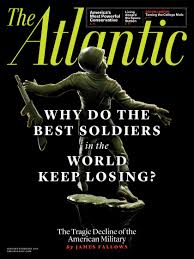
By David Swanson
The cover of the January-February 2015 The Atlantic asks “Why Do The Best Soldiers in the World Keep Losing?” which leads to this article, which fails to answer the question.
The main focus of the article is the by now endlessly familiar discovery that most U.S.-Americans are not in the military. The article is accompanied by another advocating a draft. The claim in the main article is that because most people are disconnected from the military they are more willing to send it off into unwinnable wars.
Nowhere does the author, James Fallows, attempt to so much as hint at what makes the wars unwinnable. He does claim that the last war that was in any way victorious for the United States was the Gulf War. But he can’t mean that it resolved a crisis. It was a war followed by bombings and sanctions and, in fact, the repeated revival of the war, ongoing and escalating even now.
What Fallows must mean is that once the U.S. military had done what it can do — namely, blow stuff up — in the Gulf War, it more or less stopped. The early days in Afghanistan in 2001 and Iraq 2003 saw very similar “victories,” as did Libya 2011 and numerous other U.S. wars. Why Fallows ignores Libya I don’t know, but Iraq and Afghanistan go down as losses in his book, I think, not because there’s no draft or because the military and Congress are corrupt and build the wrong weapons, but because after blowing everything up, the military stuck around for years trying to make people like it by murdering their friends and family members. Such occupations are virtually unwinnable, as in Vietnam and numerous other places, because people will not accept them, and because military attempts to create acceptance are counterproductive. A better military with more self-criticism, a draft, and an audited budget would not alter this fact in the slightest.
Fallows’ contention that nobody pays any attention to wars and militarism misses the point, but it is also overstated. “I’m not aware,” he writes, “of any midterm race for the House or Senate in which matters of war and peace . . . were first-tier campaign issues.” He’s forgotten 2006 when exit polls showed ending the war on Iraq as the number one motivator of voters after numerous candidates opposed the war they would escalate as soon as they were in office.
Fallows also overstates the impact of public separation from the military. He believes it was possible to make fun of the military in popular culture when, and because, more of the public was closer to the military through family and friends. But this avoids the general downward slide of the U.S. media and the militarization of U.S. culture which he has not shown to be completely attributable to disconnection.
Fallows thinks that Obama would not have been able to make everyone “look forward” and avoid contemplating military disasters if “Americans had felt effected by the wars’ outcome.” No doubt, but is the answer to that problem a draft or a bit of education? It doesn’t take much to point out to U.S. college students that student debt is unheard of in some nations that fight fewer wars. The U.S. has killed huge numbers of men, women, and children, made itself hated, made the world more dangerous, destroyed the environment, discarded civil liberties, and wasted trillions of dollars that could have done a world of good spent otherwise. A draft would do nothing to make people aware of that situation. And Fallows’ focus only on the financial cost of a war — and not on the 10-times-greater cost of the military justified by the wars — encourages acceptance of what Eisenhower warned would generate more warfare.
Fallows’ effort to look backwards also seems to miss the robotization of U.S. wars. No draft is going to turn us into drones, the pilots of which death machines are themselves disconnected from the wars.
Still, Fallows has a point. It is utterly bizarre that the least successful, most wasteful, most expensive, most destructive public program is largely unquestioned and generally trusted and revered by most of the public. This is the operation that coined the term SNAFU for godsake, and people are ready to believe its every wild tale. Gareth Porter explains the knowingly doomed decision to re-launch the Iraq war in 2014 as a political calculation, not as a means of pleasing profiteers, and of course not as a means of accomplishing anything. Of course, war profiteers work very hard to manufacture the sort of public that insists on or tolerates lots of wars, and the political calculation may be related to pleasing elites more than the general public. It is still worth framing as the greatest cultural crisis before us — alongside climate denial — that too many people are willing to cheer for wars and even more to accept the permanent war economy. Anything that shakes up that situation is to be applauded. http://warisacrime.org








